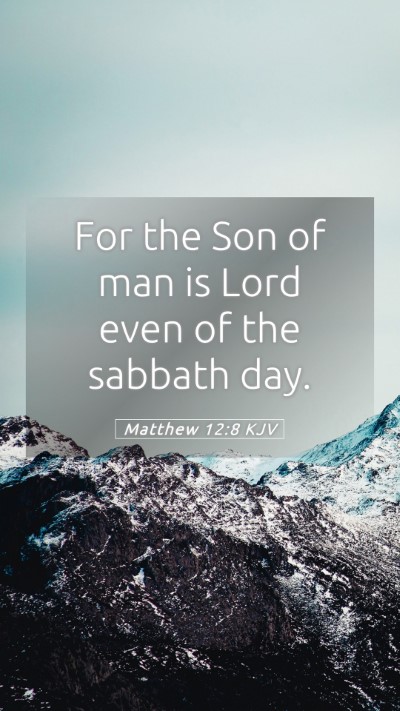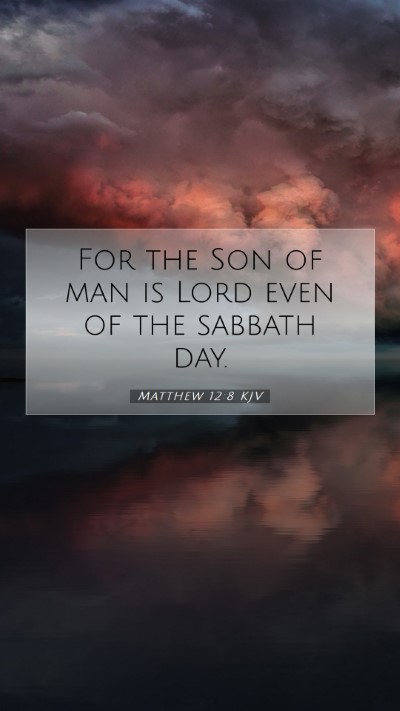Understanding Matthew 12:8
Verse: For the Son of man is Lord even of the sabbath day. (Matthew 12:8)
Bible Verse Meanings
This verse encapsulates a profound truth about the relationship between Jesus and the Sabbath—the day of rest ordained by God. Jesus identifies Himself as the “Son of man,” a title indicating His humanity and divine authority. Through this title, He asserts His dominion over the Sabbath, highlighting that His purpose transcends the law.
Bible Verse Interpretations
Matthew Henry's commentary emphasizes that Jesus' assertion not only proclaims His authority but also reveals the heart of the Sabbath law. The Sabbath was intended for the benefit of mankind, not to bind them in legalistic observance. Albert Barnes notes that this statement shows that acts of mercy and necessity are appropriate even on the Sabbath, aligning with God's overarching intent for human well-being.
Bible Verse Understanding
In light of this passage, God's law is understood not as a rigid set of rules but rather as a framework meant to lead to life and spiritual restoration. Adam Clarke adds that this verse underscores a significant shift in understanding the law's role vis-à-vis Christ’s mission on earth, facilitating a relationship characterized by grace rather than mere obligation.
Bible Verse Explanations
This phrase draws attention to the divine authority that Jesus wields—not just as a teacher, but as the Lord of the Sabbath itself. His reference to the Sabbath indicates a deeper meaning; it signifies rest in Him, which leads believers to the ultimate peace and spiritual fulfillment. The implications of this are enormous for Bible study groups exploring the nature of Christian liberty.
Scripture Analysis
- Historical Context: Understanding the Jewish custom and the seriousness with which Sabbath observance was conducted provides clarity on why Jesus’ statement was so provocative. Throughout the New Testament, the Pharisees often enforced additional rules that the tradition imposed.
- Religious Implications: By declaring Himself Lord of the Sabbath, Jesus challenges the contemporary understanding of the Law, urging believers to look beyond mechanical observance to the heart of God's intent.
Biblical Exegesis
In examining Matthew 12:8, we can contrast it with other scriptural references, which further illustrate its meaning and significance:
- Mark 2:27-28 - "The Sabbath was made for man, not man for the Sabbath."
- Hebrews 4:9-10 - Discusses the rest that remains for the people of God.
- John 5:17 - "My Father is working until now, and I am working," reinforcing the ongoing work of God on the Sabbath.
Applying Bible Verses to Daily Life
Understanding this verse helps believers recognize that their relationship with Christ liberates them to honor God without being ensnared by legalistic interpretations of the law. It invites reflection on how we view rest, worship, and daily life, advocating for a balance between devotion and the spirit of the law.
Conclusion
Ultimately, Matthew 12:8 serves as a crucial teaching on the nature of Jesus’ authority and the purpose of the Sabbath. It offers invaluable insights for any Bible study lesson or personal reflection, enriching one's grasp of scripture and the essence of grace that characterizes Jesus' teachings.
Additional Bible Cross References
- Exodus 20:8-11 - Instructions for observing the Sabbath.
- Luke 6:5 - Jesus explicitly reaffirms His Lordship over the Sabbath.
- Matthew 11:28 - Jesus invites those who labor to find rest in Him.


